Foreign dignitaries given 'grand tour of health care' at UMMC
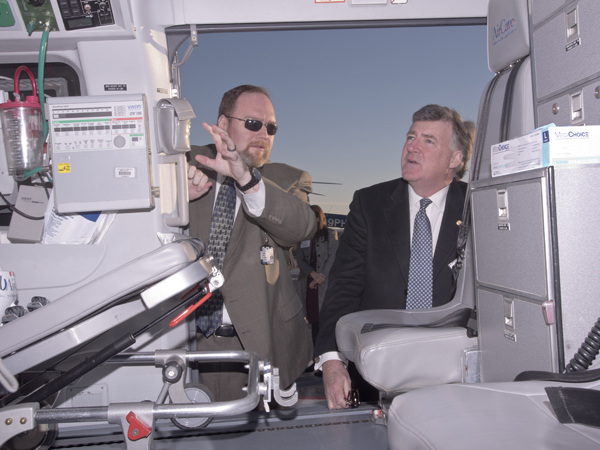
Published in News Stories on January 14, 2016
The Medical Center was given the opportunity to showcase its efforts and successes in the push towards the goal of “A Healthier Mississippi” to a group of diplomats representing Haiti, Indonesia, Greece, Turkey, Bahamas, Italy, Hong Kong, Taiwan and France on Monday.
The group, invited to celebrate the inauguration of Gov. Phil Bryant for his second four-year term as governor of Mississippi, included about 25 consuls general and trade officials from 14 countries. They were greeted by Dr. LouAnn Woodward, vice chancellor for health affairs and dean of the School of Medicine and Dr. Richard Summers, associate vice chancellor for research.
Woodward said that as the state's only academic medical center, UMMC has a unique responsibility to the state.
“We have three missions: health care, education and research. But, at the end of the day, the success, the real driving force behind everything we do is to improve the health in Mississippi,” she said.
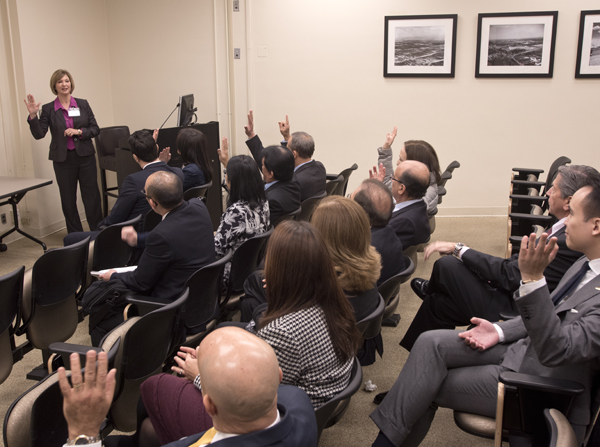
Dr. LouAnn Woodward asks for a show of hands for those visiting Mississippi for the first time.
Woodward shared with the visiting delegation the efforts that UMMC is making to grow the workforce needed for health care and science in Mississippi by building a new and larger School of Medicine building, as evidenced by the construction cranes on campus.
“We are working hard to grow our class size in the School of Medicine so that we are not last in physicians per capita,” said Woodward. “All of our schools - nursing, medicine, dentistry, health-related professions, pharmacy and graduate studies - are in a growth phase.”
Summers said that what differentiates UMMC as an academic medical system is research and discovery.
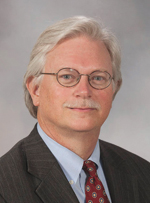
Summers
“We bring to our patients something beyond, something added, something more than they can get at a local hospital, whether it's cutting-edge, new chemotherapies for cancer treatment or new devices and techniques in surgery,” said Summers.
According to Summers, UMMC is using big data to study the population health of Mississippi “to understand what makes them the sickest of the sick” and to “tease out why certain segments of the population react and respond the way they do” to treatments.
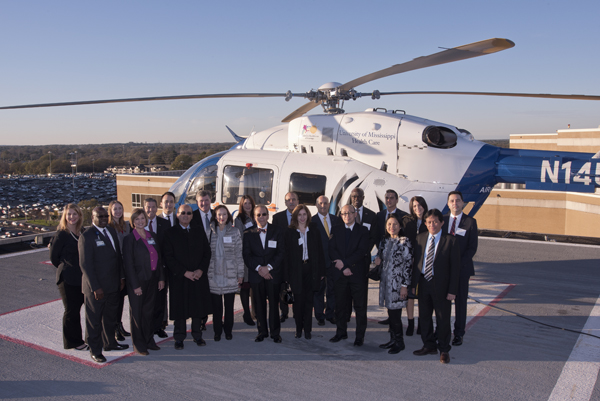
The international visitors began the tour with the helipad atop the Wallace Conerly Hospital for Critical Care, stopping for a quick group photo and to hear about the important service AirCare provides to Mississippi's sickest residents and those in need of immediate critical care such as severe trauma. The AirCare teams run about eight flights per 24-hour period and have safely transported over 16,000 adult, pediatric and neonatal patients over 2 million miles since the program began in 1996.
“I think the medical center is definitely very dynamic in providing an integrative health care approach,” said David M. Gratta, honorary consul general of Italy for the states of Mississippi and Alabama. “It has been a very favorable impression upon the Italian delegation as to the quality of health care UMMC provides to its population.”
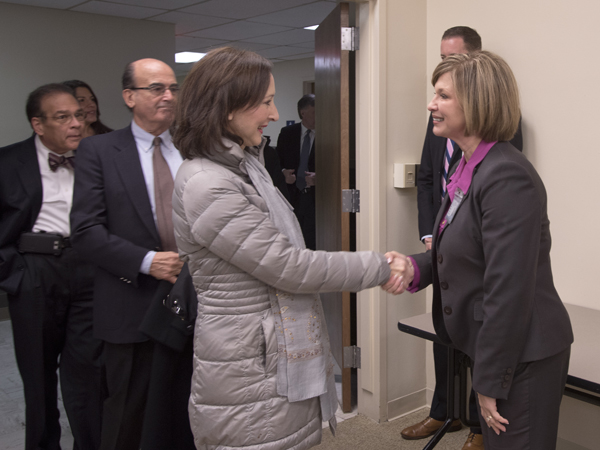
Woodward greets Gloria Bellelli, consul general for Italy in Miami.
Gratta, who lives in Hattiesburg, was accompanied by Consul General of Italy in Miami Gloria Bellelli and her husband Luigi Tomasini on this, their first visit to Mississippi.
In the dimly-lit room housing Mississippi MED-COM, Jonathan Wilson, chief administrative officer, explained how the team coordinates patient transfers from across the state.
“Mississippi MED-COM is our medical communications center, and from here we coordinate all our air and ground ambulances as well as all the incoming emergency room transfers to the Medical Center from around the state,” said Wilson.
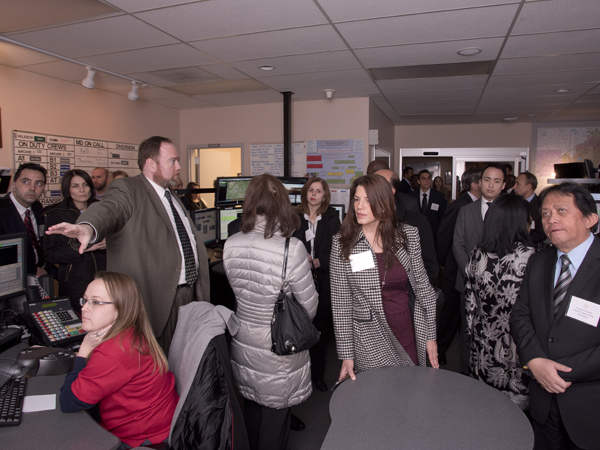
Jonathan Wilson, chief administrative officer, explains to the visiting consuls general the role of Mississippi MED-COM in the event that there is a natural disaster in the state.
Wilson said that MED-COM is staffed by trained EMT or paramedic personnel 24 hours a day, every day. The center is tied into the state-wide radio system so that the state is covered from the Gulf Coast to Memphis in the event that there is a disaster or mass casualty incident requiring the coordination of large-scale patient care.
Michael Adcock, administrator for the Center for Telehealth at UMMC explained to the delegation the “whys” behind the need for telemedicine in the United States, citing rising health-care expense, lack of specialist care in rural areas, and advances in health-care technology.
More than half of Mississippi's population live in rural areas and must drive more than 40 minutes for specialized care, which can cause delayed treatment. One way that UMMC provides specialized care in even remote locations is through telemedicine.
“Our goal is to create healthier individuals, healthier communities, drive a healthier workforce and promote a healthier economy for Mississippi,” said Adcock.
“It's a brave new world in medicine and a brand new way of treating patients, especially in remote places,” said Adamantia Klotsa, consul general for Greece. “I find it (telemedicine) very, very interesting because it combines medicine and technology. In Greece we have many remote islands, and this is a very good way to provide health care to those areas. I am really impressed.”
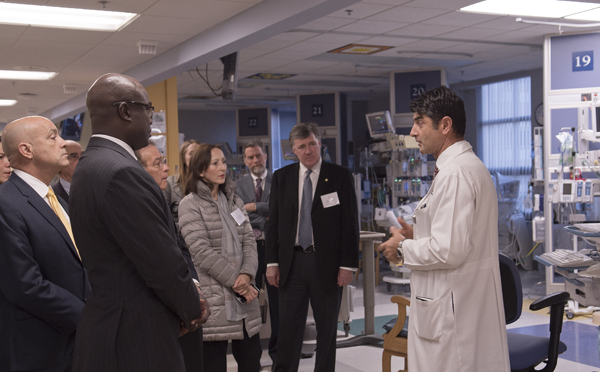
Dr. Ali Dodge-Khatami describes the work done in the PICU to guests from Haiti, Bahamas, France, Hong Kong and Italy.
The delegation heard from Dr. Rick Barr, Suzan B. Thames Professor and chair of pediatrics, and Dr. Ali Dodge-Khatami, a specialist in pediatric cardiovascular surgery, while touring the pediatric and neonatal intensive care units.
“As the only children's hospital in the state, we serve about two million children,” said Barr. “We have the only Level IV neonatal intensive care unit and the only Level 1 pediatric trauma center.
“One of our flagship programs is our pediatric congenital heart program. Dr. Khatami has brought some novel techniques that have helped us improve the care of children in Mississippi.”
Dodge-Khatami explained that heart surgeries performed at Batson Children's Hospital now frequently utilize a less-invasive approach where the heart is accessed from the under the arm and between two ribs, an approach that is used in only a few medical centers around the world. Patients have a faster recovery time and do not have a large chest incision to cause lifelong scarring.
Junji Kurokawa, chief executive director of Japan External Trade Organization office in Houston, Texas conducts research for Japanese companies looking for business opportunities in the United States. Most of the companies the organization represents are manufacturing operations; however, Kurokawa said the medical sector is an industry with high potential.
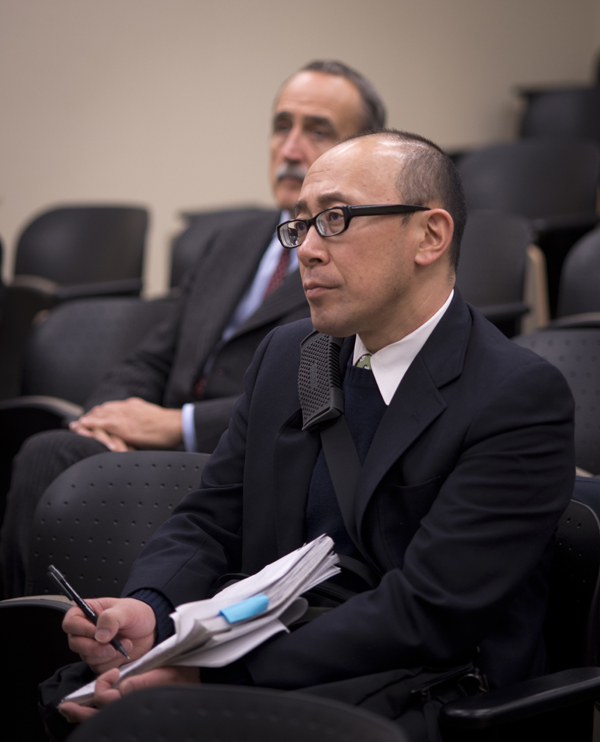
Kurokawa
“It (the tour) has been very informative,” said Kurokawa. “I'm happy to have joined this rare opportunity to hear about Mississippi's great advantages, not only for doctors and patients but also business opportunities for Japanese companies. My impression of Mississippi in the past has been that of falling behind, but being the first in the technology of telemedicine is a big thing.”
“Governor Phil Bryant has continued to prioritize health care as an economic driver for Mississippi, and no one is better positioned to lead this effort than the University of Mississippi Medical Center,” said Wesley Clay, director of economic development in the Office of the Vice Chancellor.
“We are honored that he chose UMMC as one of only two sites these foreign dignitaries visited while in Mississippi for the Governor's inaugural events. As UMMC continues to make progressive strides in research and cutting-edge clinical care, creating relationships with leaders across the country, and in this case, across the world, only serves to support our collective pro-growth, pro-Mississippi economic goals.”


